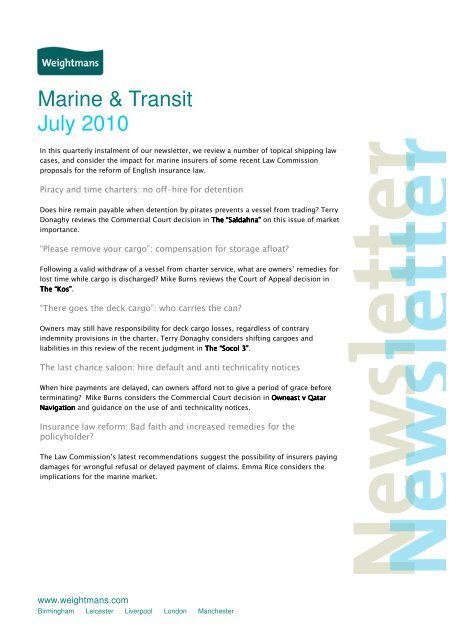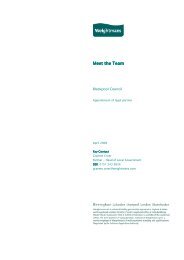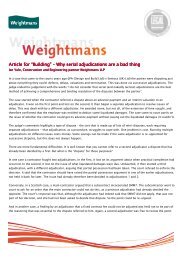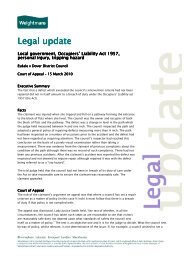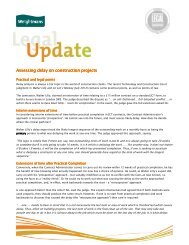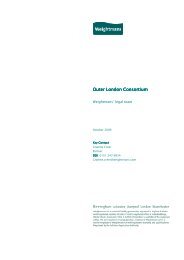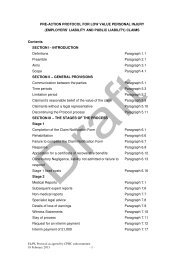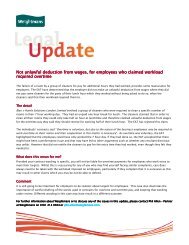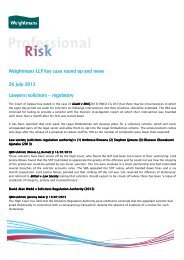Marine & Transit July 2010 - Weightmans Solicitors
Marine & Transit July 2010 - Weightmans Solicitors
Marine & Transit July 2010 - Weightmans Solicitors
Create successful ePaper yourself
Turn your PDF publications into a flip-book with our unique Google optimized e-Paper software.
<strong>Marine</strong> & <strong>Transit</strong><br />
<strong>July</strong> <strong>2010</strong><br />
In this quarterly instalment of our newsletter, we review a number of topical shipping law<br />
cases, and consider the impact for marine insurers of some recent Law Commission<br />
proposals for the reform of English insurance law.<br />
Piracy and time charters: no off-hire for detention<br />
Does hire remain payable when detention by pirates prevents a vessel from trading Terry<br />
Donaghy reviews the Commercial Court decision in The “Saldahna” on this issue of market<br />
importance.<br />
“Please remove your cargo”: compensation for storage afloat<br />
Following a valid withdraw of a vessel from charter service, what are owners’ remedies for<br />
lost time while cargo is discharged Mike Burns reviews the Court of Appeal decision in<br />
The “Kos”.<br />
“There goes the deck cargo”: who carries the can<br />
Owners may still have responsibility for deck cargo losses, regardless of contrary<br />
indemnity provisions in the charter. Terry Donaghy considers shifting cargoes and<br />
liabilities in this review of the recent judgment in The “Socol 3”.<br />
The last chance saloon: hire default and anti technicality notices<br />
When hire payments are delayed, can owners afford not to give a period of grace before<br />
terminating Mike Burns considers the Commercial Court decision in Owneast v Qatar<br />
Navigation<br />
and guidance on the use of anti technicality notices.<br />
Insurance law reform: Bad faith and increased remedies for the<br />
policyholder<br />
The Law Commission’s latest recommendations suggest the possibility of insurers paying<br />
damages for wrongful refusal or delayed payment of claims. Emma Rice considers the<br />
implications for the marine market.<br />
www.weightmans.com<br />
Birmingham Leicester Liverpool London Manchester
Piracy and time charters: no off-hire for detention<br />
Vessel l not off-hire while seized by Somali S<br />
pirates<br />
Cosco Bulk Carrier Co Ltd v Team-Up Owning Co Ltd (The “Saldanha”)<br />
[<strong>2010</strong>] EWHC 1340 (Comm)<br />
This recent important decision of the Commercial Court has ruled that a vessel that had been seized by pirates<br />
remained on-hire during that time. The terms of the time charterparty did not entitle the charterers to put the<br />
vessel off-hire.<br />
The “Saldanha” was seized by Somali pirates while proceeding through the transit corridor in the Gulf of Aden<br />
laden with a cargo of bulk coal for Slovenia. The vessel was taken to waters off Eyl in Somalia where she<br />
remained until released following payment of a ransom. The charterers refused to pay hire for a period of about<br />
two and a half months corresponding to the period the vessel was detained.<br />
The matter went to arbitration and the Tribunal awarded in favour of the owners, holding that the charterers<br />
were not entitled to put the vessel off-hire while detained by pirates. The charterers appealed to the High<br />
Court.<br />
The vessel had been chartered on an amended NYPE 1946 form which included the well known Clause 15, with<br />
some additions, the material terms of which were as follows:<br />
“That in the event of the loss of time from default and/or deficiency of men … detention by average<br />
accidents to ship or cargo … or by any other cause preventing the full working of the vessel, the payment<br />
of hire shall cease for the time thereby lost …”<br />
The charterers accepted that the vessel remained on-hire unless they could rely on one of the specific<br />
exemptions in Clause 15. They argued that detention by pirates was “detention by average accidents to ship or<br />
cargo”; alternatively that the ship’s officers had failed to take adequate anti-piracy measures to prevent the<br />
vessel’s detention and that this comprised “default and/or deficiency of men”; or alternatively that seizure by<br />
pirates came within the sweeping-up provision of “any other cause” in Clause 15.<br />
Regarding the first argument, Mr Justice Gross agreed with the arbitration tribunal that this could not be<br />
categorised as an accident, let alone an “average accident”. While this was a fortuity as far as the ship was<br />
concerned, there had been deliberate and violent intent on the part of the pirates which could not reasonably be<br />
described as an accident. Reliance was also placed on the dictum in the decision of Mr Justice Kerr in The<br />
Mareva A.S. [1977], that an “average accident” necessarily means an accident that causes damage to the ship -<br />
which had not occurred in this case.<br />
As for “default and/or deficiency of men”, the Judge also agreed with the tribunal that a narrow construction<br />
should be applied to the words. This was in line with the history of the provision, which was squarely aimed at<br />
the deliberate refusal by officers and crew to perform their duties. The provision in the clause had never been<br />
understood to apply to more general negligent or inadvertent failure by officers or crew to carry out duties on<br />
the ship. The Judge was concerned that to give the provision a much wider interpretation would radically alter<br />
the usual bargain reached between owners and charterers in a time charter concerning the risk of delay.<br />
Finally the charterers’ argument as to the sweeping-up provision of “any other cause” also failed. The Judge<br />
concluded that seizure by pirates was a completely extraneous cause, one that had no relation to the other<br />
www.weightmans.com<br />
Birmingham Leicester Liverpool London Manchester
specified exemptions in Clause 15. The addition of the word “whatsoever” to the phrase in the clause may have<br />
made a difference; but that word was not present in the provision in question.<br />
Significantly, there was in fact a separate additional clause in the charter that dealt with risk of seizure, arrest,<br />
requisition and detention by parties having a claim against or interest in the vessel. The terms of that clause did<br />
not extend to seizure by pirates, and the Judge considered it would have been open to the parties to quite<br />
easily amend or adapt this clause to cover piracy if that is what they had intended.<br />
A further salutary warning of the need for owners or charterers to very carefully examine the wordings and<br />
provisions of standard form charterparties upon which they contract and seek to ensure that any particular<br />
issues that may arise are adequately covered in the provisions.<br />
Terry Donaghy, Partner<br />
<strong>Weightmans</strong> LLP<br />
“Please remove your cargo”: compensation for storage afloat<br />
Charter termination – no compensation for waiting time<br />
ENE Kos v Petroleo Brasileiro S.A (The “Kos”)<br />
[<strong>2010</strong>] EWCA 772 (Comm)<br />
The Court of Appeal has now overturned this Commercial Court decision, reported in our September 2009<br />
newsletter:<br />
http://www.weightmans.com/library/newsletters/marine__transit_-_sept_2009/charter_termination.aspx<br />
The issue was whether a ship owner, who has validly terminated a time charter due to charterer default, is<br />
entitled to be compensated for the time the vessel is “detained” after withdrawal until the charterers’ cargo<br />
has been discharged.<br />
The “Kos” was a VLCC time chartered for 36 months, but which was withdrawn by owners following charterers<br />
delaying payment of the first hire instalment. Owners claimed damages corresponding to the 2.64 days the<br />
vessel spent holding the cargo post-termination, or about US$410,000 based on the daily rates.<br />
After dismissing (see below) a number of owners’ arguments based on charter construction, the Commercial<br />
Court had settled upon the owners being entitled to damages on principles of bailment. Although the contract<br />
under which owners were bailees of the cargo came to an end, the judge concluded that owners remained<br />
bailees of it pending discharge, and as such were entitled to recovery of expenses and “reasonable<br />
remuneration” for effectively providing a floating warehouse. The authority for that was The “Winson” [1982]<br />
AC 939, a salvage case where salvors had looked after and safely stored cargo until collection for the benefit<br />
of the cargo owners.<br />
The Court of Appeal has rejected that analysis and confirmed that owners have no entitlement to be<br />
compensated waiting time at the market rate. The reasoning (to large measure agreeing with the Commercial<br />
Court, but disagreeing on the crucial bailment point) was that:<br />
<br />
No claim arose under the employment & indemnity clause: discharging time was not a direct<br />
consequence of charterers ordering the vessel to load the cargo - “it is not a natural consequence of<br />
www.weightmans.com<br />
Birmingham Leicester Liverpool London Manchester
ordering it to be loaded that it would have to be discharged at the self same port”. The causal<br />
connection was too remote.<br />
<br />
Neither did the loss flow from charterers’ breach in the late payment of hire; rather it was the owners’<br />
own action in deciding to withdraw that directly caused the loss.<br />
<br />
There could be no implication of a contractual term giving owners rights to damages: if the charter<br />
was silent on the issue “any court should be slow to give owners by operation of law what they had<br />
failed to achieve by agreement”.<br />
<br />
No entitlement to quantum meruit arose since the owners had not performed any service for the<br />
charterers. The cargo had not been carried to its contractual destination and it could not be right to<br />
award a quantum meruit to the owners who had never purported to perform (or partially perform) the<br />
voyage contemplated.<br />
<br />
There was no new contract based upon owners’ acceptance of charterers’ request to remain at the<br />
Port and to discharge the cargo. It was inevitable the vessel would have to remain at the load port,<br />
and it was the owners who were demanding (as they were entitled to do) that charterers discharge the<br />
cargo, not charterers requesting owners’ services.<br />
However, the Court of Appeal decided the Commercial Court’s reliance on The “Winson” was wrong. That case<br />
concerned the stranding of the vessel on a reef in the South China Sea following which six parcels of wheat<br />
were salved and taken by salvors to Manila for storage at their expense. In that case the vessel’s master was<br />
an agent of necessity and had authority to create a contract between the cargo owner and the salvor. The<br />
salvors could recover actual expenses incurred for the cargo owners’ benefit (i.e. land storage costs) but the<br />
decision was not authority giving general entitlement to damages, even in extreme circumstances. It was quite<br />
a narrow point.<br />
The position in The “Kos” was very different. There was no accident or emergency. The need for dealing with<br />
the cargo on board the vessel only arose because charterers missed a single hire payment, and owners had<br />
chosen to exercise the rights to terminate. After withdrawal, owners required charterers to discharge the<br />
cargo but, at the same time, invited them to make a new contract at the increased market rate. The reason<br />
why the cargo remained on board was owners were hoping for a new contract. They could not be expected to<br />
be paid in advance something that never materialised.<br />
It was therefore a contradiction to suggest that a ship owner who exercises a right to terminate a time charter<br />
continues as a bailee for reward, when he has by his own decision brought the contract to an end. There was<br />
no injustice in charterers retaining a small incidental benefit which had only arisen from owners’ action in<br />
terminating the charter for their own motives.<br />
The decision illustrates that whilst the English courts will allow ship owners to have their contractual cake in<br />
exercising rights to terminate, they cannot expect to be able to eat it as well.<br />
Mike Burns, Partner<br />
<strong>Weightmans</strong> LLP<br />
www.weightmans.com<br />
Birmingham Leicester Liverpool London Manchester
“There goes the deck cargo”: who carries the can<br />
Owners liable l<br />
under charter for deck cargo losses<br />
Onego Shipping & Chartering BV v JSC Arcadia Shipping (The “Socol 3”)<br />
[<strong>2010</strong>] EWCA 777 (Comm)<br />
This recent decision in the Commercial Court shows that owners may not have the protection they imagined<br />
under specific exclusion clauses contained in a time charterparty.<br />
The “Socol 3” was on a voyage from Finland to Egypt with a cargo of timber packs, some of which were<br />
carried on deck. The vessel encountered heavy weather and some deck cargo was lost overboard. The<br />
remaining cargo had to be discharged at a nearby port of refuge. The vessel had been chartered on an<br />
amended NYPE 1993 Form, and various claims arose between the owners and charterers concerning the loss<br />
of the cargo, loss of time, bunker consumption and port of refuge expenses.<br />
The matter went first to arbitration in London. The Tribunal found that the cause of the casualty arose from<br />
an inadequate method of stowage of the deck cargo and use of unsatisfactory lashing equipment for which<br />
the charterers were responsible under the charter. However there had also been inadequate care of the<br />
lashings by the crew during the voyage. Further, the vessel was in fact unstable and accordingly<br />
unseaworthy following the loading of the cargo and for this aspect the owners were responsible.<br />
Nevertheless the charter contained a standard NYPE clause 13(b). This provided that the owners were to be<br />
fully indemnified by the charterers for any consequences in the event any deck cargo was carried. The<br />
Tribunal held this provision applied and found in favour of the owners. The charterers then appealed to the<br />
court.<br />
The charter also had a Clause Paramount incorporating the Hague-Visby Rules. The charterers argued the<br />
Rules applied and the owners had not complied with the obligation to provide a seaworthy ship. However Mr<br />
Justice Hamblen found that the Rules did not apply to the deck cargo. The relevant bills of lading all had<br />
“on-deck” statements. The court considered that under Article 1(c) of the Rules, the bills were to be<br />
considered as the “contacts of carriage” for the deck cargo. On this basis the Rules did not govern deck<br />
cargo carried under the charter.<br />
The Judge then considered the exclusion clauses relied on by the owners. The charter also had a standard<br />
NYPE clause 8 providing that the charterers were to perform among other things all cargo handling, loading,<br />
stowing, lashing and securing of the cargo at their risk and expense under the supervision of the master.<br />
Although in this instance the clause did not have the additional words “and responsibility” after<br />
“supervision”, the court still found the owners responsible for the deck cargo shift. In this case the improper<br />
stowage of the cargo had affected the vessel’s fundamental stability. This was an aspect that only the chief<br />
officer and master would have known about, not the charterers. There had been a failure on the part of the<br />
master to supervise the cargo stowage properly with the ship’s stability and ultimate seaworthiness in mind.<br />
Finally the owners sought reliance on NYPE clause 13(b), providing for charterers to indemnify owners where<br />
deck cargo was carried. However the court was not prepared to allow the owners to escape liability under<br />
this provision.<br />
www.weightmans.com<br />
Birmingham Leicester Liverpool London Manchester
Applying the guidelines in the House of Lords’ authority of Canada Steamship [1952], the court considered<br />
this was a type of exclusion clause that had to be read restrictively.<br />
In this case the owners had in effect been negligent causing the vessel to be unseaworthy by reason of the<br />
unstable stowage. Such a provision as clause 13 (b) would only exempt the owners for negligence if clear<br />
words to this effect were used. Such clear words were not to be found in clause 13(b) and accordingly the<br />
owners could not seek an indemnity from the charterers and remained liable for the deck cargo claims and<br />
losses.<br />
The case emphasises the rule that if a party wishes to exclude liability for his negligence in an exclusion<br />
clause, then very clear words to this effect must be employed in the contract.<br />
Something for owners and charterers to bear in mind when fixing such charters.<br />
Terry Donaghy, Partner<br />
<strong>Weightmans</strong> LLP<br />
The last chance saloon: hire default and anti technicality<br />
notices<br />
Compliance with anti technicality clauses<br />
Owneast Shipping Ltd v Qatar Q<br />
Navigation QSC<br />
[<strong>2010</strong>] EWHC1663 (Comm)<br />
Charter termination and withdrawal has been a feature of the shipping landscape since the 2008 market<br />
slump. This Commercial Court decision (on appeal from a London arbitration award) illustrates the importance<br />
of ship owners adhering to the correct contractual notices as and when termination situations arise.<br />
So called anti-technicality clauses are found in many time charters. Their purpose is to avoid a situation<br />
where owners could otherwise withdraw a vessel for a breach of any obligation (e.g. to pay hire on time)<br />
however minimal or inconsequential, and to give the charterer some measure of relief against possible<br />
forfeiture in allowing opportunity to rectify inadvertent breaches.<br />
Here, owners had time chartered a vessel on an amended NYPE form for a period of 48 months. The charter<br />
contained an anti-technicality clause which provided that:<br />
“Where there is any failure to make punctual and regular payment due to errors or omission of<br />
charterers’ employees, bankers or agents or otherwise for any reason where there is absence of<br />
intention to follow to make payment as set out, charterers shall be given by owners three banking days<br />
notice to rectify the failure…”<br />
The charterers had a patchy payment record, with 17 of 30 semi monthly payments having been paid late.<br />
Matters came to ahead in August 2006 when the semi monthly advance hire fell due on 24 August.<br />
Earlier in the month the vessel had been discharging a log cargo at Kandla when there had been a series of<br />
breakdowns. Charterers had been awaiting the statement of facts so as to deduct lost time from that payment,<br />
www.weightmans.com<br />
Birmingham Leicester Liverpool London Manchester
ut there were delays in production of the documentation. As a result, charterers’ personnel deferred from<br />
putting in place the timely approvals and payment requests which their internal processes required. By the<br />
time payment was in hand (so as to factor in the deductions) it was evident that remittance would not reach<br />
owners’ bank by 24 August. Accordingly, owners terminated with immediate effect, citing charterers’<br />
persistent failure to pay hire on time.<br />
Charterers argued the termination was wrongful, since owners had failed to give them notice to rectify the<br />
breach.<br />
Owners, however, contended an anti-technicality notice was not required: charterers purposely delayed<br />
payment while awaiting documents to support an off hire deduction. This delay, together with their internal<br />
approval hurdles, made it obvious that if payment was not sanctioned by 22 August, then its arrival by the<br />
24 th would be unlikely. In fact, the payment request was not filed with the bank until after hours on the<br />
deadline day. There was therefore an “intention to fail to make payment” that disentitled charterers being<br />
granted a three day grace period.<br />
Further, if the deduction from hire was unjustified (lacking good faith) it could not be “regular payment” as the<br />
clause required.<br />
The court, as at the majority tribunal, rejected owners’ arguments relying upon authorities including The<br />
“Libyaville” [1975] 1 Lloyd’s Rep 537 and The “Rio Sun” [1981] 2 Lloyd’s Rep 418 which showed that the court<br />
looked favourably on anti technicality clauses and did its best to give effect to them.<br />
Intention had to be interpreted narrowly, equating to a wilful and deliberate decision to pay late. It could not<br />
be extended so as to encompass recklessness.<br />
On balance, it did not appear that charterers knew there was a specific deadline by which the payment<br />
instruction had to be given to the Bank, and with that knowledge consciously decided not to send the<br />
instructions so as to meet it. Nonetheless Christopher Clarke J. acknowledged that “the dividing line between<br />
serious incompetence and deliberate delay amounting to an intention not to make punctual payment is<br />
sometimes thin”.<br />
In relation to the deduction, The “Libyaville” decision provided guidance. There, despite the deliberate<br />
payment of a lower and disputed rate of hire (which owners have previously warned against), there was no<br />
intention to fail to make a “regular” payment in the absence of evidence of bad faith. In the present case, there<br />
was no suggestion that charterers’ deduction was not bona fide.<br />
Therefore, Owners had wrongfully terminated: charterers has been entitled to service of the anti-technicality<br />
notice.<br />
This decision illustrates the exposure to owners in cutting corners, rather than erring on the side of caution in<br />
adhering to contractual notice requirements. Making assumptions will often import a heavy risk since – where<br />
intention is under scrutiny - it will only be after the event that intention (or in the case of deductions, bad<br />
faith) can be established, even if, at the time, it looks like charterers appreciate what they are (not) doing. The<br />
courts will always seek to construe such clauses in charterers’ favour, absent wording which softens/widens<br />
the meaning of intention in the context of a failure to pay hire.<br />
Mike Burns, Partner<br />
<strong>Weightmans</strong> LLP<br />
www.weightmans.com<br />
Birmingham Leicester Liverpool London Manchester
Insurance law reform: Bad faith and increased remedies for the<br />
policyholder<br />
Law Commission C<br />
proposes damages if insurers breach duty of good faith<br />
What remedies does a policyholder have if an insurer does not pay a valid claim or only pays the claim after<br />
protracted delay Current insurance law in England and Wales is not in line with the general law on damages<br />
for breach of contract. Insurance law is an exception to the usual rule that where a party breaches a<br />
contract, the other party can claim damages for any actual or foreseeable losses suffered. So, while a<br />
policyholder can sue the insurer for the actual money owed under the policy plus interest, the policyholder<br />
cannot claim damages for any further loss arising from the delay in payment.<br />
The Law Commission has been considering this issue and has published a paper proposing changes to the<br />
law in this area. The Law Commission believes the law in England and Wales should be changed to bring it<br />
more in line with that applying in Scotland and other jurisdictions such as Australia, Canada and the United<br />
States, where an insurer is under an implied obligation to pay a proper claim following a reasonable period<br />
for investigation. The paper can be found at http://www.lawcom.gov.uk under the link to “consultations”.<br />
Presently under English law, Sprung v Royal Insurance (UK) Ltd [1999] establishes that no additional<br />
damages can be claimed for a wrongly refused claim. Insurers rejected a policyholder’s claim for damage to<br />
a factory by vandals. The policyholder succeeded in establishing that the damage claim should have been<br />
paid. However by then his business had been lost and the English court rejected a claim for separate<br />
damages for lost opportunity to sell the business during the period. The reasoning behind the authority is<br />
that under an insurance contract, the insurer undertakes to hold the policyholder harmless. If there is a<br />
covered claim, the insurer is thereby in breach of contract and accordingly a payment under the policy is in<br />
fact a payment in damages. However the law does not provide for damages for failure to pay damages.<br />
The related aspect is that there is a mutual obligation on the parties to an insurance contract to observe the<br />
utmost good faith. While an insurer’s refusal to pay or delay in paying a claim may certainly be a breach of<br />
good faith, the court has held that damages are not payable for such breach (Banque Financiere v Westage<br />
Insurance Co). Section 17 of the <strong>Marine</strong> Insurance Act 1906 (which applies also to general insurance)<br />
provides that, if the obligation of utmost good faith is not observed, the contract can be avoided by the<br />
other party. This has been regarded as the only remedy available for such a breach, however this can be<br />
potentially unfair to policyholders as in such a case the premium only is refunded rather than the (usually<br />
much higher) claim paid.<br />
Consumers and small businesses have an alternative remedy, by way of the Complaints Procedure to the<br />
Financial Ombudsman Service. The FOS can compensate for late payment of claims by awarding interest, by<br />
damages for distress and inconvenience and in appropriate cases, by damages for financial loss. However,<br />
this remedy is not available to larger commercial interests. Insurers generally can also be penalised by the<br />
FOS for breach of statutory duty under the industry’s applicable rules for handling and paying insurance<br />
claims. However that will be of little assistance to a policyholder who has suffered loss as a result.<br />
The Law Commission concludes that the law on this issue is out of line with usual contract principles and<br />
those applying in other significant comparable jurisdictions. It also appears unfair to policyholders and<br />
could be seen as undermining confidence in insurance law and the insurance industry.<br />
www.weightmans.com<br />
Birmingham Leicester Liverpool London Manchester
Two approaches are proposed by the Law Commission to change the law in this area. The first would be to<br />
provide specific legislation containing guidelines on how insurers must deal with claims, such as<br />
investigating and deciding claims fairly and paying claims within a reasonable time once established and<br />
agreed. Such legislation could also contain the remedies where the insurer is in breach, such as damages<br />
for other foreseeable losses.<br />
The other approach would be to reverse the decision in Sprung v Royal Insurance. However, the Law<br />
Commission is not convinced this would be the best way forward. The Commission otherwise recognises<br />
that (subject to the application of the Unfair Contract legislation for consumers) in commercial insurance this<br />
area is generally best left to freedom of contract. The Commission considers that while insurers must be<br />
able to refuse invalid claims, the default position should rather be that the insurer bears the risk of<br />
unreasonable conduct in refusing a claim, unless this liability is properly excluded by a specific contract<br />
term.<br />
The period of consultation has now closed and the further views and conclusions of the Law Commission on<br />
this issue are awaited with interest in due course.<br />
Emma Rice, Solicitor<br />
<strong>Weightmans</strong> LLP<br />
This update does not attempt to provide a full analysis of those matters with which it deals and is provided for general information purposes<br />
only and is not intended to constitute legal advice and should not be treated as a substitute for legal advice.<br />
<strong>Weightmans</strong> LLP accepts no responsibility for any loss that may arise from reliance on the information in this update. The copyright for this<br />
update is owned by <strong>Weightmans</strong> LLP <strong>2010</strong>.<br />
www.weightmans.com<br />
Birmingham Leicester Liverpool London Manchester


